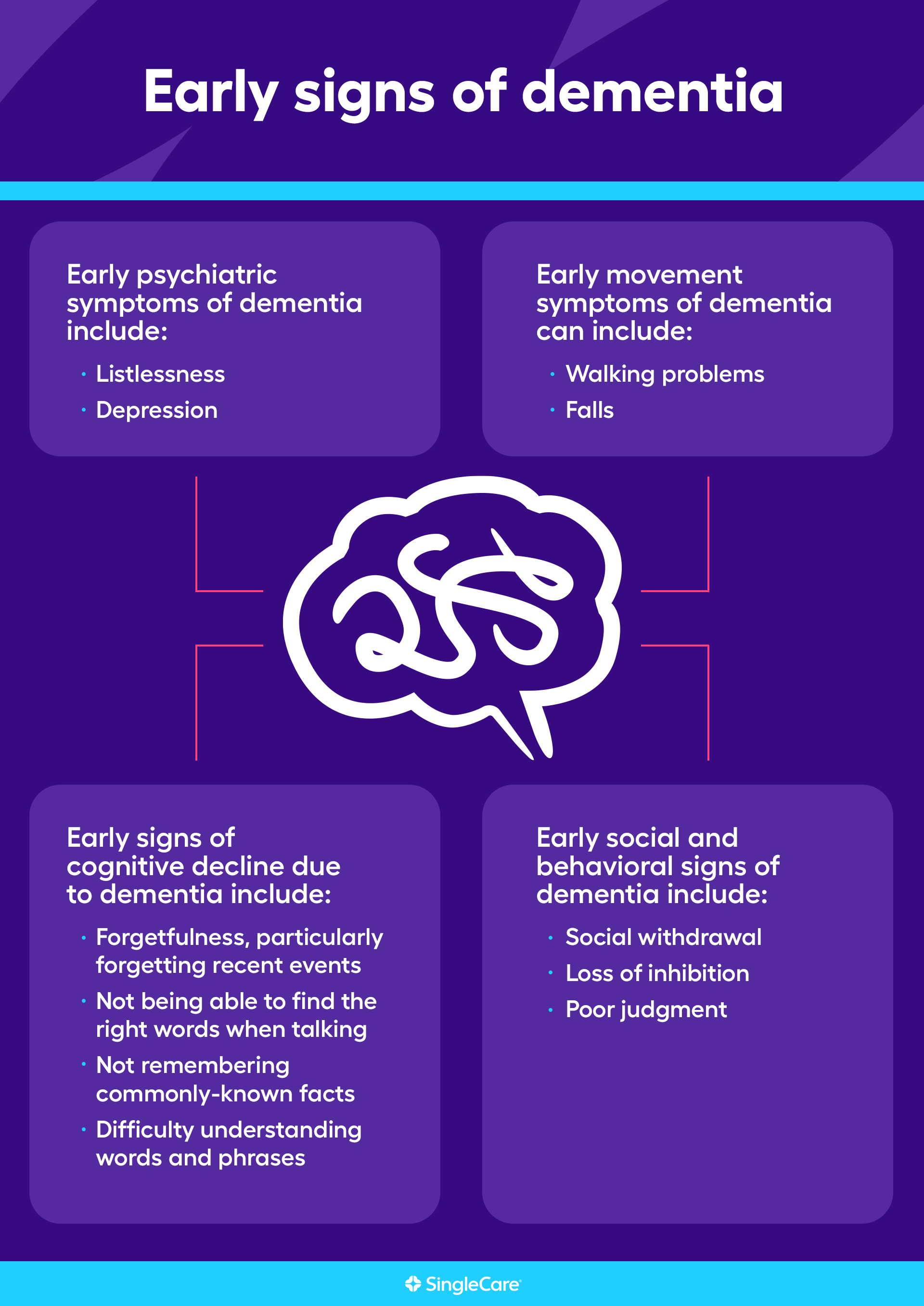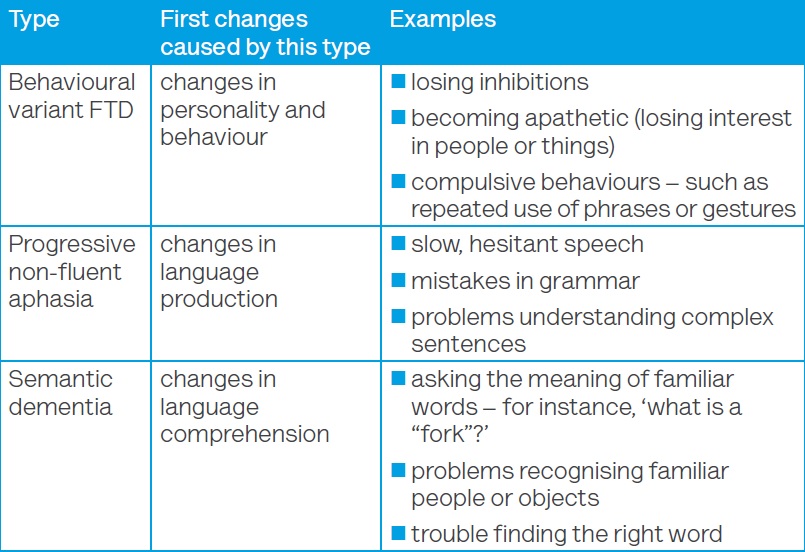10 Warning Signs That Point to Vascular Dementia
10 Warning Signs That Point to Vascular Dementia
Blog Article
Understanding the Impact of Mental Deterioration on Day-to-day Live and Caregiving
Dementia affects life in profound means, influencing not just those diagnosed however also their caretakers. As cognitive decline proceeds, you may discover changes in interaction and routine that difficulty both parties. Recognizing these shifts is important for keeping dignity and involvement. Exactly how do you adjust your caregiving techniques to sustain a person traversing this complex journey? The answers could shock you as we discover the nuances of this experience.
The Stages of Dementia and Their Results on Life
As you navigate the trip of mental deterioration, understanding its stages can considerably affect just how you take care of daily life. Dementia generally advances through three main stages: early, middle, and late.
During the middle phase, you'll experience more noticeable cognitive decrease. Daily jobs could become challenging, and keeping your freedom might need modifications. Utilizing pointers and simplifying your environment can aid.
In the late phase, individuals typically need substantial assistance with day-to-day tasks. Planning for care comes to be necessary, concentrating on comfort and lifestyle. By understanding these phases, you're far better furnished to respond proactively, guaranteeing you or your enjoyed one can browse the obstacles with self-respect and elegance.

Modifications in Interaction and Social Communication
How do changes in interaction influence your daily communications as mental deterioration progresses? As mental deterioration breakthroughs, you could see that simple discussions come to be difficult.
You may locate it less complicated to attach with these ways as opposed to counting exclusively on spoken language. Paying attention abilities can also change; you could discover it more difficult to remember or follow conversations what was just claimed (Vascular Dementia). This can cause misunderstandings or sensations of isolation
Urging patience and developing a supportive atmosphere can aid. Participating in tasks that promote link, like songs or art, can improve social communications. Remember, preserving relationships is still feasible; it's simply about adapting to brand-new means of communicating.
Influence On Daily Routines and Activities
While steering everyday regimens, you'll likely see that tasks you when finished easily become a lot more challenging as dementia progresses. Straightforward activities like cooking, dressing, and even showering might require more time and effort. You may locate on your own forgetting action in familiar regimens or battling to remember where you placed items. This can result in aggravation not just for you, however additionally for those around you.
Planning your day can feel overwhelming, making it more difficult to stick to a schedule. You may require suggestions for appointments or to take medications. Adapting your setting can aid; for circumstances, identifying products or utilizing checklists can simplify jobs. Taking part in repeated, structured activities can additionally give convenience and a sense of achievement. Remember, it's okay to request for assistance. Surrounding yourself with encouraging friends or family members can make taking care of these adjustments a bit simpler.
Emotional and Behavioral Difficulties
Steering via daily routines can cause not just practical difficulties, but additionally emotional and behavior ones. You might observe changes in state of mind, such as increased anxiety or frustration, which can originate from confusion or trouble in completing jobs. As you navigate these moments, it is essential to recognize that your enjoyed one may share their feelings with actions like agitation or withdrawal.
These psychological responses can be unforeseeable and may emerge without warning, leaving you both sensation bewildered. You might discover that acquainted environments or routines can help in reducing anxiousness, but preserving perseverance becomes significant. It is crucial to validate their feelings, also if you do not totally understand them.
The Function of Caregivers in Sustaining People With Mental Deterioration
As a caretaker, you play an important function in giving psychological support for individuals with dementia. Establishing everyday treatment routines can create a sense of stability and comfort, assisting to alleviate their anxiousness. By understanding their needs and utilizing effective strategies, you can substantially enhance their high quality of life.
Emotional Assistance Techniques
When looking after a person with mental deterioration, recognizing the psychological landscape is vital for giving effective assistance. You'll often find that patience and compassion go a lengthy method. Verify their sensations; if they share complication or stress, recognize it without disregarding their feelings. Easy gestures, like holding their hand or keeping eye contact, can develop a feeling of safety. Try to participate in activities that they appreciate, as this can trigger pleasure and link. Keep in mind to interact clearly and gradually, utilizing a calm tone. Encourage expression via songs or art, which can work as an effective outlet. Inevitably, do not fail to remember to care for your own emotional needs; looking for support for on your own can boost your capability to care for them.
Daily Care Routines
Developing daily care routines is necessary for offering security and comfort to individuals with mental deterioration, as these routines can assist minimize confusion and anxiousness. You can start by describing a regular routine for meals, activities, and rest. This predictability assists your enjoyed one feel more safe and involved.
Incorporate acquainted jobs, like folding washing or click watering plants, which can stimulate positive memories and foster a feeling of achievement. Usage visual cues, such as schedules or lists, to assist them via the day.
Be flexible, though; adjust regimens as required based on their mood or energy degrees. Frontotemporal Dementia. Bear in mind, your patience and understanding are important in steering their transforming demands, ensuring they feel supported and valued throughout their everyday life
Producing a Safe and Comfortable Living Atmosphere
Producing a secure and comfy living setting is vital for people with mental deterioration. You'll want to make home security adjustments that minimize dangers and ensure experience to supply a feeling of convenience. By concentrating on these facets, you can aid develop a room that sustains both safety and security and health.
Home Safety And Security Alterations
As you browse the obstacles of mental deterioration, making home safety and security adjustments can greatly enhance convenience and protection. Beginning by getting rid of tripping threats like carpets and clutter, guaranteeing walkways are clear. Mount grab bars in washrooms and non-slip floor coverings in the shower to protect against drops. Take into consideration utilizing brighter lighting and night lights to boost exposure, particularly during nighttime. Tag important locations, such as use this link the washroom and cooking area, with clear indications to help with alignment. Protect any type of sharp objects or toxic materials out of reach. Additionally, analyze your home's alarms and locks to validate they're easy to use and give comfort. These alterations not only promote safety yet likewise encourage freedom, enabling your loved one to really feel more comfortable in their atmosphere.
Convenience and Knowledge
After making certain a safe atmosphere with necessary adjustments, cultivating convenience and familiarity is essential for people with dementia. Beginning by customizing their room. Use familiar colors, decors, and pictures that evoke pleased memories. A preferred covering or chair can provide a sense of safety. Maintain a constant regular to aid them really feel based and reduce anxiety. Basic, acquainted dishes can also create a soothing environment. Maintain paths clutter-free and clear to avoid confusion. Incorporate soft illumination, as intense lights can be disorienting. Take into consideration including soothing scents, like lavender, to promote relaxation. Participating in familiar activities, such as paying attention to songs or horticulture, can improve their feeling of belonging, making their living atmosphere a true haven.
Methods for Efficient Caregiving and Support
While steering the obstacles of dementia care can really feel overwhelming, executing efficient techniques can greatly boost both the caretaker's and the client's daily experience. Beginning by establishing a regimen; predictability assists decrease anxiety for both you and your enjoyed one. Use clear, simple interaction-- straight inquiries and brief sentences can avoid confusion.

Don't fail to remember to deal with yourself; timetable breaks and attach with assistance teams. Sharing experiences with others in similar situations can provide beneficial understandings and emotional relief.
Last but not least, stay client and flexible. Mental deterioration can bring uncertain modifications, so adapting your strategy is crucial. By utilizing these methods, you can foster a much more positive environment that profits both you and your loved one.
Frequently Asked Inquiries

What Are the Different Sorts Of Dementia?
You'll find several sorts of dementia, including Alzheimer's, vascular dementia, Lewy body dementia, and frontotemporal dementia. Each type affects memory and cognitive feature differently, so understanding the distinctions is important for proper diagnosis and care.
Just How Can I Help Someone With Early-Stage Mental Deterioration?
You can aid a person with early-stage mental deterioration by being patient, providing support, and urging them to involve in tasks they take pleasure in. Keeping routines regular and preserving open interaction can likewise make a considerable difference in their day-to-day live.
Exist Financial Resources Available for Dementia Care?
Yes, there are funds offered for mental deterioration care. You can explore federal government help programs, nonprofit organizations, and insurance policy options. It's additionally a good idea to consult neighborhood companies for particular sources tailored to your situation.
What Lawful Considerations Should Caregivers Know?
As a browse around these guys caretaker, you ought to consider power of lawyer, healthcare proxies, and guardianship regulations. It's vital to understand the lawful rights and obligations you hold, ensuring your liked one obtains ideal treatment and defense.
Exactly How Can I Deal With Caretaker Stress?
You can deal with caregiver stress and anxiety by prioritizing self-care, looking for assistance from teams or friends, establishing realistic assumptions, taking breaks, and practicing relaxation strategies. Remember, your wellness matters simply as high as the person you're taking care of.
Recognizing the Impact of Mental Deterioration on Daily Life and Caregiving.
As you navigate the journey of mental deterioration, recognizing its stages can noticeably impact how you handle daily life.While navigating day-to-day routines, you'll likely observe that jobs you as soon as completed effortlessly ended up being a lot more tough as dementia progresses.Establishing everyday treatment regimens is important for supplying security and convenience to people with mental deterioration, as these routines can assist minimize confusion and anxiety.While steering the difficulties of dementia care can feel frustrating, implementing effective techniques can greatly improve both the caregiver's and the client's day-to-day experience.
Report this page